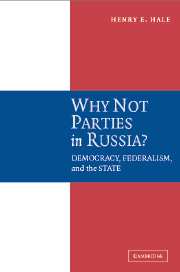Book contents
- Frontmatter
- Contents
- Acknowledgments
- 1 Electoral Markets and Russia's Political Smorgasbord
- 2 Party Entrepreneurship in Russia's Electoral Market 1989–2005
- 3 How Much Party Is in the Party System?
- 4 Electoral Markets and Party Substitutes in Russia : Origins and Impact
- 5 Parties and Party Substitutes : Determining the Balance
- 6 Conclusion : The Market Model and Theories of Parties, National Integration, and Transitions from Authoritarian Rule
- References
- Index
1 - Electoral Markets and Russia's Political Smorgasbord
Published online by Cambridge University Press: 06 July 2010
- Frontmatter
- Contents
- Acknowledgments
- 1 Electoral Markets and Russia's Political Smorgasbord
- 2 Party Entrepreneurship in Russia's Electoral Market 1989–2005
- 3 How Much Party Is in the Party System?
- 4 Electoral Markets and Party Substitutes in Russia : Origins and Impact
- 5 Parties and Party Substitutes : Determining the Balance
- 6 Conclusion : The Market Model and Theories of Parties, National Integration, and Transitions from Authoritarian Rule
- References
- Index
Summary
When Mikhail Gorbachev first introduced the USSR to competitive nationwide elections in 1989, comparative social scientists looking into a crystal ball would have seen the future they were expecting if their gaze had happened to fall on parliamentary elections in St. Petersburg's Vostochnii District a decade later. There, four major candidates were each appealing to voters on the basis of party platforms covering the most important issues of the day. Irina Khakamada, a telegenic star within the Union of Right Forces, championed radical economic reform. Stepan Shabarov extolled the patriotic socialism of the Communist Party of the Russian Federation. The Yabloko Party's Yury Nesterov advocated a gentler market and emphasized human rights. And Aleksandr Morozov appealed quite specifically to the interests of the older generation as a nominee of the Pensioners' Party. Indeed, while political scientists have disagreed markedly on almost everything else, one thing upon which almost all have concurred is that political parties are inevitable in democracies. Seminal works call democracy without political parties “unimaginable” (Max Weber), “unthinkable” (E. E. Schattschneider), “unworkable” (John Aldrich). The conceptual consensus underlying such statements is that electoral institutions and important social divides combine to force sets of likeminded politicians to work together or to give up their dreams of influence.
If our crystal ball were capable of ranging beyond Russia's “window to the West,” past the Urals, and on to the distant Omsk Region's Bol'sherechenskii District, however, these same political scientists would have been quite surprised by another image of the same 1999 parliamentary elections.
- Type
- Chapter
- Information
- Why Not Parties in Russia?Democracy, Federalism, and the State, pp. 1 - 25Publisher: Cambridge University PressPrint publication year: 2005



